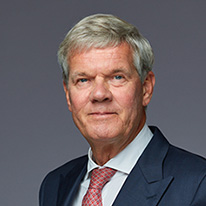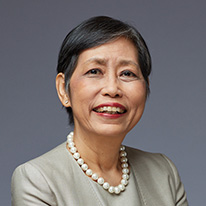Nomination and Succession Committee

Focus areas for 2022
- Non-executive Director and Executive Committee succession;
- Continued talent engagements with key staff and succession candidates; and
- Maintain proactive oversight over Shell’s ambition to become one of the most diverse and inclusive organisations in the world.
Priorities for 2023
- Support the changes proposed from the 2022 Board/Committee evaluation;
- Non-executive Director and Executive Committee succession;
- Continued talent engagements with key staff and succession candidates; and
- Support an increased level of disclosure with regard to Shell’s diversity targets and maintain proactive oversight over Shell’s ambition to become one of the most diverse and inclusive organisations in the world.
Committee membership and attendance for 2022

Sir Andrew Mackenzie
Chair of the Committee
100% attendance
5 out of 5 possible meetings attended
Member since: October 1, 2020

Dick Boer
Committee member
100% attendance
5 out of 5 possible meetings attended
Member since: May 19, 2021

Euleen Goh
Committee member
100% attendance
5 out of 5 possible meetings attended
Member since: July 1, 2019

Ann Godbehere
Committee member
100% attendance
5 out of 5 possible meetings attended
Member since: October 27, 2021
Committee member |
Member since |
Maximum possible meetings |
Number of meetings attended |
% of meetings attended |
|---|---|---|---|---|
Sir Andrew Mackenzie (Chair of the Committee) |
October 1, 2020 |
5 |
5 |
100% |
Dick Boer |
May 19, 2021 |
5 |
5 |
100% |
Ann Godbehere |
October 27, 2021 |
5 |
5 |
100% |
Euleen Goh |
July 1, 2019 |
5 |
5 |
100% |
Purpose
The Nomination and Succession Committee (the “Committee”) leads the process for appointments to the Board and Senior Management [A] positions, ensures plans are in place for orderly, well-planned succession, and oversees the development of a diverse succession pipeline of candidates. It also reviews the Company’s policy and strategy on diversity, equity and inclusion (DE&I), and monitors the effectiveness of these initiatives. It makes recommendations to the Board on corporate governance guidelines, as referred to in the Chair’s introduction.
[A] "Senior Management” refers to the Executive Committee and the Company Secretary.
Talent management and succession
The Committee is fully engaged with the end-to-end talent management and senior succession planning approach that is deployed within Shell. It plays a key role in senior succession and resourcing. Retaining in-depth knowledge of the individuals within the talent pipeline is a Committee priority. The Committee makes time to personally meet and engage with numerous individuals within the pipeline. The Committee’s oversight and input extend from recruitment to leadership identification and from leadership development to leadership appointment, all of which are underpinned by clearly articulated talent priorities and a commitment to advancing diversity, equity and inclusion across Shell.
The Committee manages Board and Senior Management succession under a structured, proactive methodology. The processes have clear and agreed selection principles for short-, medium- and long-term succession and are aligned with Shell’s strategic priorities.
For Non-executive Director succession, the Committee continues to follow its Principles for the Strategic Composition of the Board, adding factors as they evolve. These principles function much like a policy and include both quantitative and qualitative principles, considering:
- the overall aspired Board composition and diversity of gender, race and ethnicity, nationality, background, experience and desired skill sets that align with the Company’s strategy and purpose; and
- the values, attitudes, and behaviours expected of Directors.
Over the coming year the Principles for the Strategic Composition of the Board will be reviewed and the Committee will support the business in aligning with its Powering Progress diversity ambition, of becoming one of the most diverse and inclusive organisations in the world, into firmer targets for the Board and Senior Management. In addition, Shell’s external reporting against these targets will be enhanced. Shell’s Board and Senior Management diversity metrics are already well positioned against the new UK Listing Rules requirements.
This information can be found in section “Diversity of leadership”.
For Senior Management succession, the selection principles include process-specific elements, such as a clear and proactive approach to identifying and developing succession candidates. The principles also outline the long-term structured nature of the succession planning process. There is also great focus on ensuring that the principles reflect the leadership qualities required for future business success and that they advance the progress of diversity in all its forms.
Senior Management principles feature in the Committee’s review of the succession plans which occurs in every Committee meeting. Using the principles, the Committee implements any changes through a well-defined and diligent process with overall Board engagement. The Committee agrees on candidate profiles and meets prospective candidates well ahead of any selection decision being necessary. It also engages the Board early in the process to ensure all Directors have an opportunity to meet and assess prospective candidates. Consequently, some of the leaders whom the Committee and Board have engaged with extensively in the past are now members of the Board or the Executive Committee.
In 2022, the Committee undertook its annual in-depth look at the status and succession plans for Senior Management within Shell and reviewed the talent pipeline in line with the business outlook. The engagement focused on the organisational health of our workforce; Powering Lives (covering areas such as enablement and disability and LGBT+ inclusion, gender diversity in leadership roles, nationality and ethnicity and race representation), the depth and breadth of the senior executive leadership pipeline including progress in enhancing diversity, the skills, behaviours and development support required for future success, and an evolving outlook on senior executive roles. Following the Committee’s review, the findings were reported to the Board.
Senior Succession and Resourcing Review
Diversity of leadership
The Committee recognises that continuing to improve all types of diversity at each level of the Shell Group is crucial. Shell aims to be an inclusive workplace where everyone feels valued and respected and has a strong sense of belonging. The Committee’s review of diversity objectives and strategies for the Shell Group as a whole also monitors the impact of diversity and inclusion initiatives.
In February 2021, Shell published its aspirations for diversity, equity and inclusion under the “Powering Lives” goal, with a focus on four areas of gender, race and ethnicity, LGBT+ and disability inclusion. When looking at our progress against our ambitions, female representation has steadily improved in recent years. Among experienced recruitment in 2022, Shell companies recruited 40% females, and among graduates 49%. Female representation in the top 1,250 roles (“Senior Leadership” positions) has strengthened by 1% during 2022 to 30.4%, and we continue to progress towards our aim of achieving 35% female senior leadership representation by 2025. Nationality diversity, such as Asian and American talent, continues to be managed in accordance with the business outlook and we have a strong focus on progressing race and ethnic minority representation, beginning in the UK and the USA and followed by the Netherlands. The representation of people of colour among Shell’s senior leaders in the USA has been actively tracked for many years. It stood at 26% at the end of 2022, compared with 17.3% in 2016. In the UK, race and ethnic minority representation among senior leaders was 18.2% [A].
[A] As ethnicity declaration is voluntary, our ethnicity declaration rate is not 100% and all calculations are based on a declaration rate of 71.5%. The 28.5% of our workforce who have not provided data or chosen not to declare their ethnicity were not included in our calculations.
Senior Leadership is a Shell-specific measure and different from that which we are required to report under the Code, being female representation in Senior Management and their direct reports, where the percentage is 28%.
Although the Committee monitors Shell’s organisational diversity, equity and inclusion strategies and initiatives, it also holds itself accountable for the Board’s own diversity and inclusion. By the end of 2020, the Board’s diverse composition met the Hampton Alexander and Parker Reviews’ objectives by reflecting 38.5% female representation with one person meeting BAME criteria. Following the 2021 AGM, 50% of the Board were women. However, in October 2022 we announced the appointment of Cyrus Taraporevala effective March 2, 2023 and in February 2023 we announced further changes to the Board, with the retirement of Euleen Goh and Martina Hund-Mejean and the appointments of Leena Srivastava and Sir Charles Roxburgh effective March 13, 2023. Therefore, following the 2023 AGM, scheduled for May 2023, if all directors proposed for appointment/reappointment are approved by shareholders, female representation will be 42%, and the Board will exceed the BAME criteria, with three members from an ethnic minority background.
More information on diversity, equity and inclusion in Shell is provided in the Powering lives section.
The People Strategy and diversity, equity and inclusion
During the year, the Committee continued an in-depth examination into our approach on diversity, equity and inclusion building on the deep dive held on LGBT+ inclusion and extending this into disability and enablement inclusion, with participation from both employee representatives and Human Resources professionals. This followed the format of the examination of the Shell People Strategy that the Committee undertook in 2020, which placed particular emphasis on our Mindset and behaviours. The Committee will be conducting further engagements in 2023 to maintain proactive oversight over Shell’s ambition to become one of the most diverse and inclusive organisations in the world, where everyone feels valued and respected, with a focus on race and ethnicity and gender representation.
Committee activity
In addition to its considerations regarding succession (some of which were in the early part of 2023), the Committee made recommendations on corporate governance guidelines, monitored compliance with corporate governance requirements and made recommendations on corporate governance-related disclosures. The Committee continues to monitor and review this area, considering whether and how current Company governance matters should be strengthened. Further insight on some of the Committee’s areas of consideration in 2022 is provided below.
Succession [A] |
Topic of discussion/example of Board activity |
||
|---|---|---|---|
Recommendation |
|
||
Review and oversight |
|
||
Oversight |
|
||
Engagement |
|
||
|
|
||
Talent overview and senior succession review |
Topic of discussion/example of Board activity |
||
Shell Senior Succession and Resourcing Review covering Executive Director and Executive Committee (EC) succession, EC direct reports, the senior executive group and the overall talent pipeline |
|
||
|
|
||
Board membership and other appointments |
Topic of discussion/example of Board activity |
||
Directors’ tenure, external commitments, conflicts of interests and succession planning |
|
||
|
|
||
Governance |
Topic of discussion/example of Board activity |
||
Governing the Board and its committees |
|
||
Regulation, legislation and other governance-related guidance |
|
||
Shell plc matters |
|
||
|
|||
Board succession
During the year the Committee’s robust and effective succession planning supported the appointment of a new Chief Financial Officer (Sinead Gorman), who joined the board on April 1, 2022, and a new Chief Executive Officer (Wael Sawan), who joined the Board on January 1, 2023. Some of the Committee activities in supporting these appointments are outlined below.
The Committee undertakes comprehensive engagement to understand who the candidates are for senior roles, what personally drives them and how they will ensure Shell achieves its strategic ambitions.
The Committee plans well in advance for succession and reviews plans regularly. Succession planning is a crucial, ongoing consideration and not just an area of focus when a Director is nearing the end of their tenure. The Board oversees a rigorous and sophisticated Shell succession planning process in which selection is the final step of a considered well-planned process.
For Executive Director and Executive Committee appointments, the Committee has set a structured process:
- Before any potential decision on resourcing, it explicitly describes the requirements of the role and the candidate profile.
- By working in a planned consistent manner, last-minute surprises are avoided and well-considered decisions are made in line with evolving business requirements. We saw this in action in 2022.
- It also plans for the unexpected and maintains a list of candidates capable of stepping into senior roles to provide cover if necessary.
The Committee spends time getting to know the candidates to ensure that the pipeline is robust, diverse and adaptive. The Committee ensures it has visibility of today’s and tomorrow’s leaders. Over the last few years, the Committee has met many leaders and had extensive engagements with each of them. Some of these leaders now sit on the EC, others were appointed to the Board (Sinead Gorman and Wael Sawan).
The Committee engages across the Executive talent pipeline to ensure it interacts with and becomes familiar with talent at different levels of the organisation; for example, on a regular basis informal engagements are held with employees from a range of businesses, functions and backgrounds prior to a Board meeting. Not only does this engagement support senior succession, it also provides a helpful element of the Committee’s workforce engagement.
The Board is proud that candidates for the most senior leadership roles have primarily come from within the business, proving that the leadership development and succession process remains effective.
CEO succession
Although the process was initially led by the Nomination and Succession Committee, the Board was fully engaged throughout the process. All Non-executive Directors provided input into the candidate profile and role specification and outlined what they saw as the challenges facing the business over the next five to ten years. They helped map out leadership and personal qualities needed to be effective, ranked these in order of importance and shared their views of the current culture within the business. Throughout the process the Board was supported by Shell Human Resources executives in tandem with external professional executive assessment and search support.
Both internal and external candidates were considered for the position. The list of preferred qualities and functional focus elements included leadership experience at a large, complex global business; leadership/track record of substantial transformation/change; strong customer orientation; from an industry with a complex supply chain (industrial, engineering or technology); experience of managing substantial stakeholder pressure (with differing views); understanding of large capital projects (not necessarily oil and gas sector), along with certain character requirements.
Updates were provided to the Board and potential candidates discussed. In the final stages of the process, the potential candidates presented to, and were interviewed by, the full Board.
In Wael Sawan we believe that we have found the required qualities and more. Wael Sawan is an exceptional leader, with all the qualities needed to drive Shell safely and profitably through its next phase of transition and growth. His track record of commercial, operational and transformational success reflects not only his broad, deep experience and understanding of Shell and the energy sector, but also his strategic clarity. He combines these qualities with a passion for people, which enables him to get the best from those around him. The outcome of the Board’s managed succession process resulted both in the appointment of an outstanding CEO and proved the strength and depth of Shell’s leadership talent.










